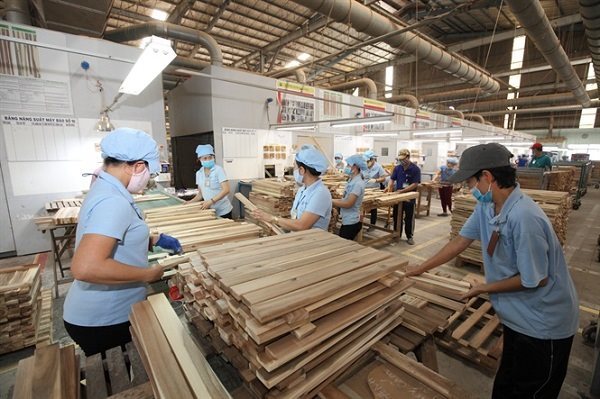Wooden furniture manufacturers face liquidity problems amid COVID-19 crisis - VietNamNet
by VietNamNet News, https://www.facebook.com/vietnamnet.vnVietnam’s wooden furniture industry was expected to have a prosperous year in 2020 after the US-China trade war broke out in 2019. But hopes have been dashed by Covid-19.
Predicting a bright future, wooden furniture manufacturers poured all the money they had into projects on expanding production capacity, believing that more and more orders would come. Lam Viet JSC was one.

However, the pandemic has upset their plans.
According to Nguyen Lam, president of Lam Viet, before the pandemic outbreak, the company used 1,000 workers who made wooden furniture products for export to the US and EU. The company exported 150 containers a month and earned export turnover of $32 million a year.
However, because of Covid-19 and the lack of orders, the number of workers has fallen from 1,000 to 400.
Clients still cannot pay debts. Many containers of goods have been left at ports, because clients still don’t have money to get them. Many products are still in stock. Meanwhile, the company needs a large amount of money to pay workers and bank loan interest.

| Vietnam’s wooden furniture industry was expected to have a prosperous year in 2020 after the US-China trade war broke out in 2019. But hopes have been dashed by Covid-19. |
Lam Viet has worked with banks to negotiate debt payment extension, because it doesn’t have revenue to pay debts right now. The company has to finalize old credit contracts in order to get new loans at lower interest rates.
However, Liem said the interest rate cuts of 0.5-1.5 percent offered by some commercial banks can only partially help settle enterprises’ problems.
The biggest problem faced by Lam Viet and many other wooden furniture enterprises is cash flow. It will take time to solve this problem. After the epidemic ends, people will prioritize to spend money on essential goods such as food, not on wooden furniture.
Do Xuan Lap, general director of Tien Dat Furniture Corporation, said as big clients asked for delivery delays, Tien Dat now operates with just 50 percent of capacity. The inventory value is very high if noting that the value of each order is $3-4 million. While the book value is high, the liquidity is nearly at zero.
Some commercial banks have accepted to lower the interest rates for Tien Dat’s dollar loans. HDBank has eased the interest rate from 4.5 percent to 3.8 percent, Techcombank from 3.8 to 3.5 percent and Vietcombank from 4.1 to 3.4 percent.
Many entrepreneurs complain that the interest rate cuts are not enough to help unfreeze the cash flow for enterprises. Meanwhile, the policies have to go through complicated procedures to reach enterprises. Lap said he still cannot access other preferential credit packages, except interest rate reductions.
Mai Lan